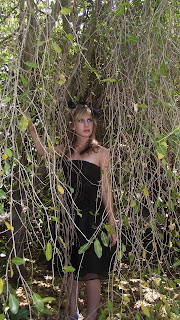"How do you even get started writing a book??"
I've been asked this question many times. Many, many times.
To begin, I never set out to write a book. I started jotting down ideas for a "story." (Silly me, thinking I could do something so short and simple!) My husband bought me a little Moleskin notebook when he noticed I was scribbling on random bits of paper. I was constantly muttering to myself and making notes. "What if the girl does this? Or if she was like this?" I'd wake up in the middle of the night with a sudden new idea and write it down as fast as I could so I wouldn't lose it.
I went back to school to finish my B.A. after my second son was born. In a writing class, we had an assignment to write a three to four page short story. I had a light bulb moment. *My notebook with bits of ideas!* I sat down and started plugging away. When I was on page ten, I realized I had a problem. "Hey, Chris. Um, I'm about seven pages over where I should be. I don't think I can shorten this story." My husband (genius that he is) said, "Why don't you leave it and start something new? Work on the longer one later." *ding ding ding, we have a winner!*
I wrote a cute little short story about a diner. I told my friend Allison about my longer story. "It's about a princess and some messed up fairy blessings." "E-mail it to me and I'll read it." *gasp!* Could I show someone my story? Something that I had worked on, written little notes about for so long? Part of my
heart was in it. I sucked it up and sent it along. And I'm very glad that I did. Allison and I are now writing and critique partners. (She's an amazing writer with SO many stories written.) It's great to have someone read your work and know where it can be stronger. Or which characters to work on and which ones to kill off.
My super easy formula for writing is this - pick your main character (MC). Guy or girl? Name your MC (one of my favorite things to do!) What attributes does she have? Write those down. What does she look like? What world is she living in? Family structure? Write everything down. And do NOT throw it away/delete it. You never know what you can use later.
Next, ask yourself, "What is the main problem?" What is your MC going through? Lastly, "How does the problem get resolved?" That's your main outline: multi-faceted character in world, big problem, resolution of problem.
Now, fill in the rest! That's the fun part. Who does your MC meet? Friend or foe? What influences your MC to act? Is there a love interest? How does that play into the final plot resolution? Does your MC grow during the story? (I hope so!) No one likes a static character. If it's a YA novel, there should be some sign of growth, of maturity.
Once you're done outlining, work on a bit of dialogue. Give your characters an authentic voice. They should each sound different from each other. Maybe the grandmotherly sort of characters don't use contractions. Maybe someone has an accent. Maybe a character is always being interrupted. Find those catch phrases for each character.
From there, start writing!
Look at your outline, start at Chapter One, and just...let go. Let your fingers start writing. Your imagination will kick in. Don't overthink things. DO NOT EDIT YET. You can always edit later.( I name my manuscripts (MS) as THE SEVENTH BLESSING_1, TSB_2, TSB_3, etc.) Don't save over your previous work.
Make a new file. You might go back a few days, weeks, months later and say, "What was that one line that I loved??" You can look at previous "editions" and find that line or descriptor that worked.
Very importantly, find a writing buddy/critique partner. This can be someone online or someone local. Find a person whose reading/writing habits mesh with yours. You don't want a CP who only reads once a month while you read every day. That is unbalanced and can create animosity. If your CP hates sci-fi and that's what you write, that's not going to work out. Find a CP and give it a trial run. See what comments that person makes on, say, ten pages of your MS. Do you value their input (even if you don't
like it?). What I mean is, can you see the value of their criticism? It might hurt but does it make your writing better?
After you have a few edits done to it, send it on to some "beta testers." Hopefully these are friends who can read on the computer. (Not everyone can do this for lengthy periods of time.) Listen to what your betas say about the story. You don't have to change your whole story for them but see if they point out any plot holes or unanswered questions. If they are seeing those, you can guarantee your future readers will see those.
So, that's what I do. What do you guys do? :)







































